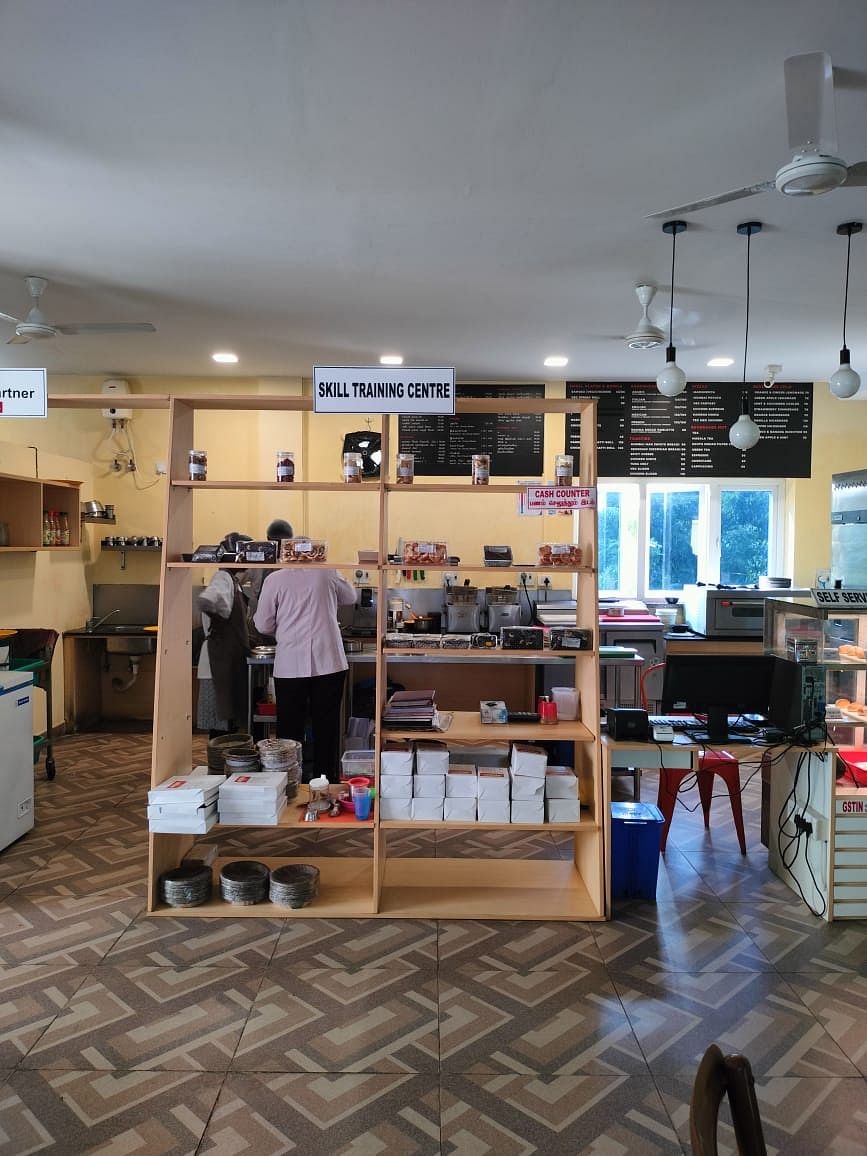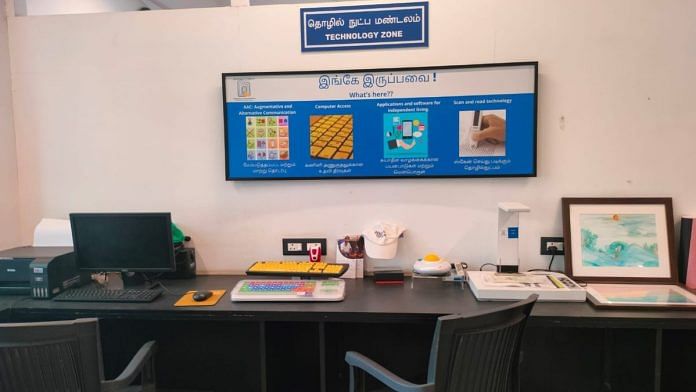Chennai: Two men stand in a bright kitchen with teal cabinets and countertops set against a white tiled background. It looks like a standard cookie-cutter kitchen, but it holds a passel of possibilities. “Imagine your kitchen. Can a person with disabilities use that space without help?” asks A Prabhakaran. He then rolls his electric wheelchair into the kitchen, pushes a button on a cabinet, and pulls down the cupboard full of utensils. He doesn’t get up or strain himself or even exert force. And that’s the beauty of the Museum of Possibilities on Marina Beach in Chennai. Like Alice in Wonderland, the space has more than six impossibilities before breakfast.
“Small efforts are enough to make a change. You can reduce the height of the kitchen counter or make sure that the spoons and knives have an extra grip so that anyone can easily handle it,” says Prabhakaran (48), the museum manager who has cerebral palsy.
The museum in Chennai’s Kamarajar Salai lives up to its name in every possible way. It demonstrates how every place, whether at home or in the office, can be made accessible for persons with disabilities with just a little effort.
People with disabilities comprise five to eight per cent of India’s population and public and private infrastructure are woefully inaccessible. The museum is a much-needed intervention in propagating Universal Design thinking—a style followed to make spaces accessible to everyone regardless of age, disability and other factors—which is yet to take off in India. The design templates offered at the museum don’t just assist people with disabilities. but can also potentially help a larger population including pregnant women and the elderly.
Surendran, a visitor who has worked in the field of assistive technology, checks the heft of a spoon in the kitchen. It’s thicker than regular cutlery, and its curved handle has been designed for better grip.
“The models in the museum are far more advanced and user-friendly than the ones I have seen. Some of these technologies are completely new to me. But it seems many people don’t know about this facility,” he says. Adaptive, assistive and inclusive is the unwritten ethos of this museum.
The museum’s ‘Work’ exhibit has a Bluetooth-enabled keyboard with black and yellow buttons and key guards—plastic overlays with holes that isolate each key. The colour contrast and the key guards help people with visual challenges identify the right keys. Other exhibits include a touch-sensitive mouse that needs only a gentle amount of hand pressure and a head mouse, a cap-like device that allows the cursor to be controlled by head movements.
There’s even a cafe—soon to be showcased on MasterChef Tamil—that provides vocational training to people with disabilities.

The Museum of Possibilities has had over 8,000 visitors since it was launched in June 2022 by the Tamil Nadu government and the non-profit Vidya Sagar, which manages and curates the exhibits. Some of the visitors are people with disabilities and their parents exploring how they can adapt these solutions to fit their homes. Others are start-up founders and representatives from corporate houses who are trying to understand ways to improve their spaces for people with disabilities. Students, too, regularly visit the museum to learn more about assistive technologies.
“We aim to make all places accessible. So we want to inspire the young generation, especially students of architecture and engineering,” says Prabhakaran.
Also Read: Disability, Diwali, Durga Puja. Not everyone is invited in Delhi’s festive season
An experiential museum
A tactile map at the entrance of the building gives a clear lay of the land, while Prabhakaran with his warm and welcoming smile is ready to guide visitors. Before taking on this role at the museum, he was a receptionist at Vidya Sagar. The non-profit which works with special needs children has a three-year contract with the state government to manage the Museum of Possibilities.
“I was shy before. But now, I have to spread awareness. It was challenging at first. But now I can talk,” he says with a smile. To get to work, he has to travel almost 40 km by auto from his home in Porur, where he lives with his wife and daughter. At work, he has the assistance of five other staff members—a visual therapist, a speech therapist and three guides.
Every item in the museum has a QR code for audio guides. Surendran is particularly impressed with the exhibits in the bathroom. Everything from the western commode to the shower area has been designed for easy mobility with handles and stands.
“We (his workplace) built an accessible bathroom in Madurai. But it’s nothing like what is here,” says Surendran.
Even the two-storey building follows the template of universal design. The museum has three main domains—‘live’, ‘work’ and ‘play’ with the aim of displaying how even small changes like thicker handles and adjustable tables can make everyday utilities accessible to everyone.
Unlike traditional museums where exhibits are roped off or encased in glass, the Museum of Possibilities allows the guests to experience its exhibits. Touching is not just allowed but encouraged. Visitors can play a tactile Snakes and Ladders game, try their hand at the adaptive music instruments and sink into a cushionless sofa.
The elements used in the exhibits are sourced from online vendors including Amazon and local shops. Some of it is even imported with price tags up to a lakh. According to Kaaba Nazia Omer, the speech therapist at the museum, various start-ups have also donated their products for demonstration purposes.
She helps visitors navigate the museum and uses her knowledge of the needs of the community to source new exhibits.
“We don’t promote any of the items exhibited for sale. But if anyone wants to buy anything,” said Omer.
She recalls a call they had got from a nine-year-old boy, Aryan, two months after the museum was inaugurated. He had attended the inauguration and was inspired to make an object detector using normal glasses for his visually impaired grandmother. He did this by attaching a micro-sensor to the glass frame to help the wearer identify objects. It is now exhibited in the museum.
Apart from accessibility exhibits, the walls of the museum are adorned by paintings—picturesque landscapes to post-modern canvases—with price tags, drawn by artists with disabilities.
“The profit from the sales will solely go to the artists. We have sold paintings worth nearly Rs 1 lakh so far,” Omer said.
Another visitor, Paroma, weaves in and out of the exhibits. She heard about the museum from a friend.
“More such initiatives should be made as we move away from the concept of colonial museums,” says Paroma. She would like to see exhibits on the history of the disability rights movement.
Also Read: Disability influencers on Instagram have one loud message. They don’t exist to inspire you
Vocational training
On the first floor, in the Museum Cafe, 27-year-old Gayathri serves fresh juice to a group of patrons, who have their laptops open in front of them. It’s a Wednesday afternoon, and most of the tables in the cafe overlooking the Bay of Bengal are empty. Gayathri is a trainee at the Museum Cafe, which provides vocational training to students with disabilities.
After serving the customers, she walks to the kitchen where five other student trainees are serving themselves lunch. The cafe-in-charge, Mohanakrishnan, also joins them for a meal of rice and curry.
In collaboration with a popular chain in Chennai, Winners Bakery, the museum cafe offers pizzas, burgers, sandwiches, and fruit juice. Gayathri, who has been training in the cafe for over a year, is proud of her juice and pizza-making skills. She hopes to find employment at another cafe in the city once her training comes to an end.
The Tamil Nadu government is helping the museum take baby steps to popularise itself and its signature cafe. AK Kamal Kishore, director of the government’s commissionerate for the welfare of the differently abled, says the department is planning to host more events at the museum to increase awareness. He has also requested other state government departments to contract catering requirements for their events to the cafe, which will help boost sales.
“And MasterChef Tamil, for which we have granted permission for a collaboration, will hopefully draw more visitors,” says Kishore.
(Edited by Theres Sudeep)



